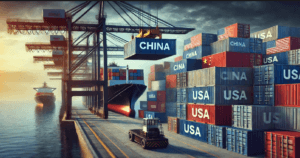China’s Imports Decline Unexpectedly as U.S. Trade Tensions Escalate
China’s imports unexpectedly dropped by 8.4% in January-February, while exports grew only 2.3%, signaling economic uncertainty. The decline comes as U.S. President Donald Trump imposed a 10% tariff on Chinese goods, citing fentanyl concerns. The tariffs disrupted trade flows, while the Lunar New Year slowed factory output. Analysts suggest China is adjusting strategic reserves, reducing imports of iron ore, crude oil, and grains. Export growth weakened due to falling global demand and trade restrictions. Key industries like electronics and machinery faced reduced orders from the U.S. and Europe. With a $170.52 billion trade surplus, China may need stronger policy measures to stabilize growth.

China’s Imports Decline Unexpectedly as U.S. Trade Tensions Escalate
China’s imports saw an unexpected drop in the first two months of the year, while export growth slowed significantly, adding to concerns about the country’s economic recovery amid escalating trade tensions with the U.S.
The renewed trade conflict intensified after U.S. President Donald Trump imposed an additional 10% tariff on Chinese goods, citing Beijing’s insufficient action to curb fentanyl exports. The new tariffs disrupted exporters who were trying to ship products before the restrictions took effect. Additionally, factory activity declined due to the Lunar New Year holiday, further weighing on trade figures.
Analysts believe the sharp drop in imports signals a shift in China’s strategy for purchasing key commodities, likely in preparation for prolonged economic friction with the U.S. Xu Tianchen, a senior economist at the Economist Intelligence Unit, pointed out that the decline in imports of grains, iron ore, and crude oil could indicate efforts to adjust strategic reserves. In particular, he noted that reduced iron ore purchases may be linked to excessive steel production outpacing actual demand.
Until now, China’s export sector had been a rare source of economic strength, even as the country struggled with weak consumer and business confidence, largely due to a prolonged crisis in the real estate sector. However, newly released customs data shows that imports plunged 8.4% year-over-year—far below the forecasted 1% increase and a stark contrast to December’s modest 1% growth. Exports, meanwhile, grew by just 2.3%, falling short of analysts’ expectations of a 5% rise and slowing significantly from the 10.7% surge recorded in December.
The drop in imports underscores deepening economic uncertainty as China prepares for an extended period of trade friction with the U.S. The newly imposed tariffs are putting additional pressure on businesses, disrupting supply chains, and weakening market confidence. Washington has justified the move by citing China’s failure to prevent the illegal export of fentanyl, but the move has heightened fears of a broader economic slowdown.
The most significant declines in imports were seen in essential raw materials like iron ore, crude oil, and grains, which could be a sign that China is managing its reserves more conservatively. Some analysts also suggest that softer domestic demand may be playing a role, as industries cut back on raw material purchases in response to slowing economic activity. Xu Tianchen pointed out that China’s steel production has outpaced actual economic demand, leading to a pullback in iron ore imports.
Meanwhile, the slowdown in exports—previously a pillar of economic resilience—suggests weakening global demand for Chinese goods. The modest 2.3% growth in outbound shipments reflects increasing trade barriers and geopolitical uncertainties. Key sectors like electronics and machinery, which had previously driven export expansion, are now facing reduced orders from major markets such as the U.S. and Europe.
China’s trade surplus for the period stood at $170.52 billion, highlighting the growing gap between imports and exports. With trade tensions escalating and economic instability persisting, analysts warn that Beijing may need to implement stronger policy measures to stimulate growth and restore investor confidence.
Check out TimesWordle.com for all the latest news
You must be logged in to post a comment.